2016 Postmortem
Related: About this forumUS Contribution to Death of Honduran Activist Goes Unmentioned in US Coverage
This news you should know BEFORE the election.
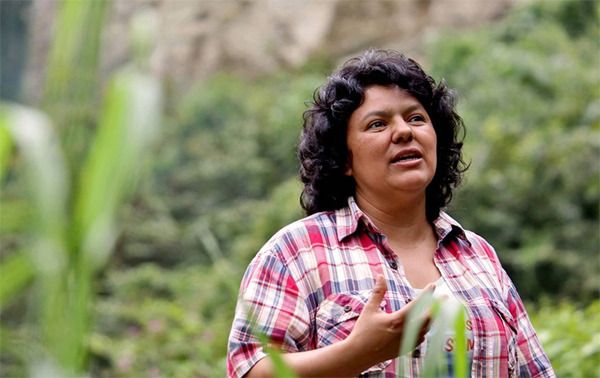
As Greg Grandin at The Nation explains:
Cáceres was a vocal and brave indigenous leader, an opponent of the 2009 Honduran coup that Hillary Clinton, as secretary of State, made possible. In The Nation, Dana Frank and I covered that coup as it unfolded. Later, as Clinton’s emails were released, others, such as Robert Naiman, Mark Weisbrot and Alex Main, revealed the central role she played in undercutting Manuel Zelaya, the deposed president, and undercutting the opposition movement demanding his restoration. In so doing, Clinton allied with the worst sectors of Honduran society. -- This photo of Honduran environmental activist Berta Caceres accompanied The Nation‘s expose of the US role in her death. (image: Goldman Environmental Prize)
US Contribution to Death of Honduran Activist Goes Unmentioned in US Coverage
By Adam Johnson
Fairness and Accuracy In Reporting/FAIR.org, March 4, 2016
EXCERPT...
The Honduran military abducted President Manuel Zelaya at gunpoint and flew him out of the country on June 28, 2009. While the coup unfolded before the international community, the United Nations, the EU and the Organization of American States rushed to condemn it. Fifteen House Democrats joined in, sending a letter to the Obama White House insisting that the State Department “fully acknowledge that a military coup has taken place and…follow through with the total suspension of non-humanitarian aid, as required by law.”
But Clinton’s State Department staunchly refused to do so, bucking the international community and implicitly recognizing the military takeover. Emails revealed last year by the State Department show that Clinton knew very well there was a military coup, but rejected cries by the international community to condemn it. As The Intercept’s Lee Fang reported, Clinton attempted to use her lobbyist friend Lanny Davis to open up back channels with Roberto Micheletti, the illegitimate interim ruler installed after the coup, effectively endorsing the new right-wing government that would go on to crack down on Cáceres and others activists.
In her memoirs, Clinton herself discloses she had no intention on restoring the elected President Zelaya to power. “In the subsequent days [after the coup] I spoke with my counterparts around the hemisphere, including Secretary Espinosa in Mexico. We strategized on a plan to restore order in Honduras,” Clinton wrote, “and ensure that free and fair elections could be held quickly and legitimately, which would render the question of Zelaya moot.”
On September 28, State Department officials blocked the OAS from adopting a resolution that would have refused to recognize Honduran elections carried out under the dictatorship—giving the US’s final seal of approval to the military coup that began three months prior.
One wouldn’t know any of this reading US reports of Cáceres’ death. The coup, and its subsequent purging of environmental, LGBT and indigenous activists, is treated as an entirely local matter, reduced to the “cycle of violence” cliche often employed with destructive governments the United States helped usher into power.
CONTINUED UNDEMOCRATIC AS ALL HELL...
http://fair.org/home/us-contribution-to-death-of-honduran-activist-goes-unmentioned-in-us-coverage/
Ha ha. It is to laugh at fascism.
Octafish
(55,745 posts)And I wrote about it later on DU:
Aristide told me the Generals ran Dope, Inc. on Haiti. Personally.
Posted by Octafish in General Discussion (Through 2005)
Sat Mar 20th 2004, 06:49 PM
Sorry if the following is an old read. The thing held true then and holds true still…
I met Jean Bertrand-Aristide after he was deposed by the generals in the early 90s. He came to metro Detroit and spoke before the Cranbrook Peace Foundation.
The newspaper I then worked for didn’t see any reason for sending me to cover Aristide’s speech. The editors weren’t BFEE, but the events on a Caribbean island just weren’t “local” enough for their budget. So, I went on my own time.
The Cranbrook people were happy to see me. They wanted, of course, as much coverage as possible. So, they invited me and the other interested reporter types to have at him for an hour before his address.
I’m ashamed to report, at an important event in two nation’s larger media market, only a couple of CBC radio reporters out of Windsor and one local Detroit TV crew bothered to show. I was the lone print guy. Anyway…
Aristide answered every question asked in English or French. He also told us about life in Haiti, where there were four doctors to care for 4 million people. Another interesting stat: One percent of the population own 99-percent of the property.
I asked Aristide what the United States could do to help him restore democracy to Haiti? Aristide said all Poppy Doc Bush had to do was pick up the phone, call the generals and say, “Get out,” and they would quit their coup and the first democratically elected leader of Haiti in 75 years would be returned to power. Bush didn't and Aristide wasn't until Clinton sent the US Marines, many years and many Haitian lives later.
The reason for Bush Senior's inaction? Aristide said he didn’t know the answer, but he suspected Bush’s politics favored the landowners over the masses. (“Sounds familiar,” I then thought and still think today.)
Aristide said that the generals were deep into the wholesale cocaine importation business. Now who would be their partner in all that? Besides the wealthy landowners, for whom the Generals worked, I mean.
http://journals.democraticunderground.com/Octafish/785
As I believe ALL people are created equal, I also stand for democracy with the poor and non-European of extraction.
Eternal thanks to the Cranbrook Peace Foundation, one of the best things ever to happen.
monicaangela
(1,508 posts)kgnu_fan
(3,021 posts)I only got to know something about this because of Democracy Now Coverage....
http://www.democracynow.org/2005/2/28/the_haiti_coup_one_year_later
monicaangela
(1,508 posts)After wreaking virtual hell on many countries in Africa, Latin America, and who knows where else while in the office of Secretary of State. More to the story:
As the U.S. Secretary of State, Hillary Clinton resisted and ultimately overcame the virtually unanimous efforts of other Western Hemispheric and European leaders to oust the coup-regime. She was backed-up in this retrograde decision by U.S. President Barack Obama. Without her efforts, and President Obama’s passive acceptance of her decision, the coup-installed regime wouldn’t have remained in power, and the freely elected President would have been restored to power to complete his term.
The results of this for both the U.S. and Honduras have been disastrous: the world’s highest murder-rate, soaring drug-trafficking, and the exodus of hundreds of thousands of Honduran children who don’t want to spend their lives drug-trafficking, and who have left Honduras because the gangs kill children who refuse. Then, U.S. Republicans, whose representatives in Congress were passionate supporters of the coup-installed regime, complain about the influx of those children into the U.S. and demand they be sent back to die there.
The democratically elected progressive President of Honduras, Manuel Zelaya, was overthrown by Honduras’s aristocracy, in a coup on 28 June 2009, organized by that country’s nearly dozen aristocratic families, whose suffocating control over Honduras was being threatened by the entirely lawful and progressive democratic policies and actions by Zelayas’s government, including land-reform and workers’ rights — two things that aristocracies everywhere oppose.
The key to whether or not the coup-regime would remain, or else Zelaya restored to complete his term, was whether or not the U.S. Government would allow financial aid to the Honduran Government to continue. This hinged on whether or not the term “coup” was to be applied to the overthrow. Here is what the U.S. Ambassador in Honduras wrote to the State Department about that:
From: Ambassador Hugo Llorens, U.S. Embassy, Tegucigalpa, Honduras, 24 July 2009.
To: Secretary of State, White House, and National Security Council.
“SUBJECT: TFHO1: OPEN AND SHUT: THE CASE OF THE HONDURAN COUP”
http://rinf.com/alt-news/latest-news/hillary-clinton-caused-the-hell-in-honduras/
Thanks for posting this Octafish...I wonder if anybody is paying attention these days.
Octafish
(55,745 posts)Like some great DUer said, there's only one federal agency that really listens.
Hillary's Evasive Views on the NSA
On the eve of her presumptive bid for the White House, the former senator is willfully obscuring the positions she would take as president
CONOR FRIEDERSDORF
The Atlantic FEB 25, 2015
Hillary Clinton is almost certain to launch a bid for the presidency. But at least for now, she's determined to keep the public guessing about her stance on NSA spying. As Edward Snowden's revelations forced the issue to the fore of national debate, she kept mum, even as other prospective candidates staked out positions.
On Tuesday, the technology journalist Kara Swisher raised the subject of surveillance while questioning the former Secretary of State. "Would you throttle back the NSA in the ways that President Obama has promised but that haven't come to pass?" she asked. Clinton's successfully evasive answer unfolded as follows:
Clinton: Well, I think the NSA needs to be more transparent about what it is doing, sharing with the American people, which it wasn't. And I think a lot of the reaction about the NSA, people felt betrayed. They felt, wait, you didn't tell us you were doing this. And all of a sudden now, we're reading about it on the front page...
So when you say, "Would you throttle it back?" Well, the NSA has to act lawfully. And we as a country have to decide what the rules are. And then we have to make it absolutely clear that we're going to hold them accountable. What we had because of post-9/11 legislation was a lot more flexibility than I think people really understood, and was not explained to them. I voted against the FISA Amendments in 2008 because I didn't think they went far enough to kind of hold us accountable in the Congress for what was going on.
Swisher: By flexibility you mean too much spying power, really.
Clinton: Well yeah but how much is too much? And how much is not enough? That's the hard part. I think if Americans felt like, number one, you're not going after my personal information, the content of my personal information. But I do want you to get the bad guys, because I don't want them to use social media, to use communications devices invented right here to plot against us. So let's draw the line. And I think it's hard if everybody's in their corner. So I resist saying it has to be this or that. I want us to come to a better balance.
This will not do. The answer elides the fact that Clinton has not been a passive actor in surveillance policy. "What the rules are" is something that she was responsible for helping to decide. She served in the United States Senate from 2001 to 2009. She cast votes that enabled the very NSA spying that many now regard as a betrayal. And she knew all about what the NSA wasn't telling the public. To say now that the NSA should've been more transparent raises this question: Why wasn't Clinton among the Democrats working for more transparency?
CONTINUED...
http://www.theatlantic.com/politics/archive/2015/02/hillary-clintons-evasive-position-on-nsa-spying/386024/
You are most welcome monicaangela! Thank you for grokking what's at stake: Democracy.
monicaangela
(1,508 posts)I believe this is slight of hand on the part of the elite in this country. Keep their eye on Donald Trump because he is bad and scaring the hell out of segments of the population so that those who should be interested in finding out about Hillary Clinton and her escapades instead, look to her as their savior. Unbelievable.
Zorra
(27,670 posts)Look below to see what Kissinger meant when he said "She ran the State Department in the most effective way he's ever seen."
But Clinton’s State Department staunchly refused to do so, bucking the international community and implicitly recognizing the military takeover. Emails revealed last year by the State Department show that Clinton knew very well there was a military coup, but rejected cries by the international community to condemn it. As The Intercept’s Lee Fang reported, Clinton attempted to use her lobbyist friend Lanny Davis to open up back channels with Roberto Micheletti, the illegitimate interim ruler installed after the coup, effectively endorsing the new right-wing government that would go on to crack down on Cáceres and others activists.
http://fair.org/home/us-contribution-to-death-of-honduran-activist-goes-unmentioned-in-us-coverage/
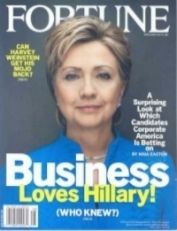
Octafish
(55,745 posts)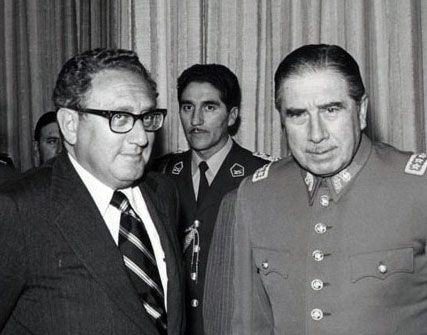
One thing else we should know before the election, Kissinger and his bosses and friends also loathe Social Security from a Chicago Boy who helped implement the destruction of Chile's Social Security for Pinochet and Company's enrichment:
President Clinton and the Chilean Model.
By José Piñera
Midnight at the House of Good and Evil
"It is 12:30 at night, and Bill Clinton asks me and Dottie: 'What do you know about the Chilean social-security system?'” recounted Richard Lamm, the three-term former governor of Colorado. It was March 1995, and Lamm and his wife were staying that weekend in the Lincoln Bedroom of the White House.
I read about this surprising midnight conversation in an article by Jonathan Alter (Newsweek, May 13, 1996), as I was waiting at Dulles International Airport for a flight to Europe. The article also said that early the next morning, before he left to go jogging, President Bill Clinton arranged for a special report about the Chilean reform produced by his staff to be slipped under Lamm's door.
That news piqued my interest, so as soon as I came back to the United States, I went to visit Richard Lamm. I wanted to know the exact circumstances in which the president of the world’s superpower engages a fellow former governor in a Saturday night exchange about the system I had implemented 15 years earlier.
Lamn and I shared a coffee on the terrace of his house in Denver. He not only was the most genial host to this curious Chilean, but he also proved to be deeply motivated by the issues surrounding aging and the future of America. So we had an engaging conversation. At the conclusion, I ventured to ask him for a copy of the report that Clinton had given him. He agreed to give it to me on the condition that I do not make it public while Clinton was president. He also gave me a copy of the handwritten note on White House stationery, dated 3-21-95, which accompanied the report slipped under his door. It read:
Dick,
Sorry I missed you this morning.
It was great to have you and Dottie here.
Here's the stuff on Chile I mentioned.
Best,
Bill.
Three months before that Clinton-Lamm conversation about the Chilean system, I had a long lunch in Santiago with journalist Joe Klein of Newsweek magazine. A few weeks afterwards, he wrote a compelling article entitled,[font color="green"] "If Chile can do it...couldn´t North America privatize its social-security system?" [/font color]He concluded by stating that "the Chilean system is perhaps the first significant social-policy idea to emanate from the Southern Hemisphere." (Newsweek, December 12, 1994).
I have reasons to think that probably this piece got Clinton’s attention and, given his passion for policy issues, he became a quasi expert on Chile’s Social Security reform. Clinton was familiar with Klein, as the journalist covered the 1992 presidential race and went on anonymously to write the bestseller Primary Colors, a thinly-veiled account of Clinton’s campaign.
“The mother of all reforms”
While studying for a Masters and a Ph.D. in economics at Harvard University, I became enamored with America’s unique experiment in liberty and limited government. In 1835 Alexis de Tocqueville wrote the first volume of Democracy in America hoping that many of the salutary aspects of American society might be exported to his native France. I dreamed with exporting them to my native Chile.
So, upon finishing my Ph.D. in 1974 and while fully enjoying my position as a Teaching Fellow at Harvard University and a professor at Boston University, I took on the most difficult decision in my life: to go back to help my country rebuild its destroyed economy and democracy along the lines of the principles and institutions created in America by the Founding Fathers. Soon after I became Secretary of Labor and Social Security, and in 1980 I was able to create a fully funded system of personal retirement accounts. Historian Niall Ferguson has stated that this reform was “the most profound challenge to the welfare state in a generation. Thatcher and Reagan came later. The backlash against welfare started in Chile.”
But while de Tocqueville’s 1835 treatment contained largely effusive praise of American government, the second volume of Democracy in America, published five years later, strikes a more cautionary tone. He warned that “the American Republic will endure, until politicians realize they can bribe the people with their own money.” In fact at some point during the 20th century, the culture of self reliance and individual responsibility that had made America a great and free nation was diluted by the creation of [font color="green"] “an Entitlement State,”[/font color] reminiscent of the increasingly failed European welfare state. What America needed was a return to basics, to the founding tenets of limited government and personal responsibility.
[font color="green"]In a way, the principles America helped export so successfully to Chile through a group of free market economists needed to be reaffirmed through an emblematic reform. I felt that the Chilean solution to the impending Social Security crisis could be applied in the USA.[/font color]
CONTINUED...
http://www.josepinera.org/articles/articles_clinton_chilean_model.htm
No one knows this history, apart from a few well-read people including a good number of DUers. Thanks for grokking and being one, Zorra!
Agnosticsherbet
(11,619 posts)The man at the top set American Policy.
monicaangela
(1,508 posts)The President doesn't micro manage every department in his government although I sometimes wish he would. The policy decision in this case was made by Hillary Clinton and rubber stamped by President Obama, so technically you are correct, he could have said no.
Octafish
(55,745 posts)Originally, President Obama backed ousted Honduran president (supporters shown in civilian clothes below).
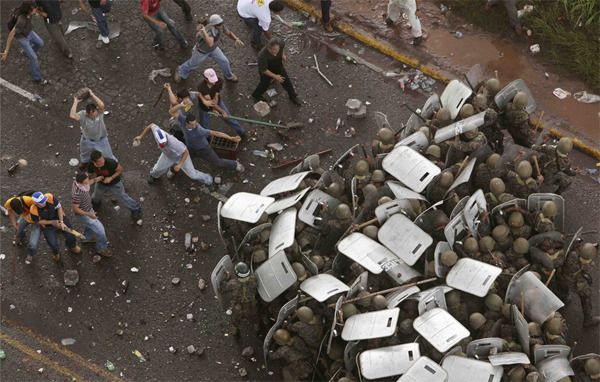
Dancing with Monsters: The U.S. Response to the 2009 Honduran Coup
"A coup anywhere in Latin America is a very big deal.”
By Alvaro Valle
Harvard Political Review, April 13, 2015
SNIP...
The U.S. Response
Latin American governments immediately denounced Zelaya’s ouster as a military coup. The United States was not quite as decisive in its diction, with the initial statement from the Obama administration merely calling on “all political and social actors in Honduras to respect democratic norms.” Obama did go on to denounce the coup in the following days, but Frank noted that Obama’s characterization of the government change was very important. “He very clearly failed to call it a military coup. If he had called it a military coup, the United States would have had to immediately suspend all police and military aid,” Frank explained. “Eventually some money sent was suspended, but the vast majority was not.”
Following the coup, President Obama called many times for the reinstatement of Zelaya. In contrast, Secretary of State Clinton made remarks that were far more equivocal. When asked if the United States had any plans to alter aid to the coup government, , “Much of our assistance is conditioned on the integrity of the democratic system. But if we were able to get to a status quo that returned to the rule of law and constitutional order within a relatively short period of time, I think that would be a good outcome.” Clinton seemed to prioritize having a stable regime over preserving democratic ideals.
As further evidence, Clinton wrote in her book, Hard Choices, “In the subsequent days [after the coup] … we strategized on a plan to restore order in Honduras and ensure that free and fair elections could be held quickly and legitimately, which would render the question of Zelaya moot,” revealing that even as the administration publicly advocated for Zelaya’s return, Clinton was not working to ensure that it would happen.
Pastor added that Clinton had personal connections with supporters of the coup government that may have led her to soften her stance. For instance, Lanny Davis, Bill Clinton’s former personal lawyer and a longtime Hillary Clinton supporter, lobbied in Washington for the Honduran coup government, Honduran elites, the Business Council of Latin America, and the American companies that took issue with Zelaya’s reforms. Bennett Ratcliff, another top Democratic campaigner with close ties to the Clintons, also worked for the Honduran coup government as a lobbyist in Washington. These personal connections to advocates for the coup government raise troubling concerns that political ties influenced Clinton’s stance.
In Clinton’s defense, these personal connections were not the only political forces supporting the coup. Levitsky noted that initial opposition to the coup in the United States may have given way because “Republicans held a couple of major U.S.-Latin America appointments: the Assistant Secretary of State for Western Hemisphere Affairs and the Ambassador to Brazil. They held these positions hostage to a softening of U.S. policy toward the coup government.”
CONTINUED w/ links sources etc....
http://harvardpolitics.com/united-states/us-honduran-coup/
Of course, it's plausible that all this just happened to favor Empire at the expense of Democracy. Then, it would be mere coincidence that today many if not most of the progressive -- socialist -- regimes in South America and Central America have been replaced by rightist regimes. Kind of reminds me of another time in history when the State Department/CIA made an end-around directives from the Oval Office.
Octafish
(55,745 posts)What Hillary Clinton did on behalf of Wall Street and War Inc:
Nephew of murdered Honduran activist Cáceres: 'The atmosphere is terrifying'
Silvio Carrillo grew up alongside Berta Cáceres, a leading campaigner for human rights. After the deaths of hundreds of campaigners in Honduras in the span of a few years, he believes his aunt was targeted for her efforts
by David Smith
The Guardian, March 9, 2016
Silvio Carrillo holds a creased black and white photo of a three-year-old girl, frowning at the camera and clutching a doll, and fights back the tears. The girl grew up to be his aunt, Berta Cáceres, a fearless human rights activist and heroine to indigenous people in Honduras. Last week, she was shot dead in her home, a day shy of her 45th birthday.
Cáceres had long complained of death threats from police, the army and landowners’ groups over her opposition to one of Central America’s biggest hydropower projects. She won the 2015 Goldman environmental prize, regarded as the world’s top award for grassroots environmental activism.
Carrillo, 43, told the Guardian he believed she had been targeted for her work. “She pissed a lot of people off … She was a major threat to the establishment.
“She was a moral leader. She was put on this grand stage and that multiplied when she won the Goldman prize. If you heard her speak, she was powerful. She was near becoming impossible to take down,” he said.
Cáceres earned admiration – and enemies – leading a decade-long fight against a project to build a dam along the Gualcarque river, which is sacred to the Lenca people and could flood large areas of ancestral lands and cut off water supplies to hundreds. A week before her death, she had spoken out against the murder of four indigenous leaders in the Lenca community.
The co-founder of the Council of Indigenous Peoples of Honduras (Copinh) was shot four times by gunmen at her home in La Esperanza at around 1am on Thursday. Gustavo Castro Soto, a Mexican human rights activist, survived by playing dead after bullets grazed his cheek and left hand. The attack was internationally condemned.
Carrillo, a US citizen who lives in Oakland, California, learned the news in a dawn phone conversation with his weeping mother, who was Cáceres’ eldest sister. He said the investigation had been mishandled from the start, with officials and the media circulating wild rumours of two perpetrators, 11 perpetrators, a crime of passion, a random robbery (nothing was stolen) or a power struggle within Copinh.
CONTINUED...
http://www.theguardian.com/world/2016/mar/09/berta-caceres-honduras-activist-murder-nephew-silvio-carrillo-interview
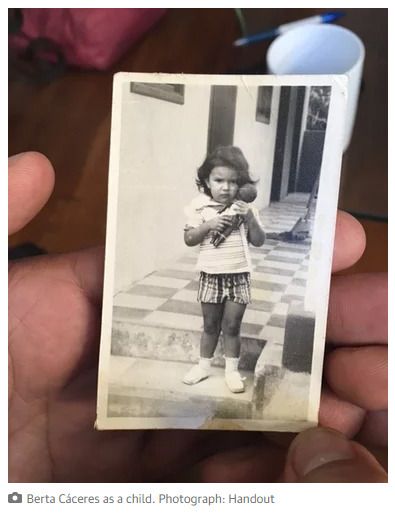
Wonder if this will come up in tonight's "Latino Hispano Americano" debate on Univision?
Octafish
(55,745 posts)One candidate has a lot to be ashamed of.
Honduras is still reeling from last week’s assassination of Berta Cáceres, one of the country’s most well-known environmental and indigenous leaders. She was gunned down in her home early Thursday, less than a year after she won the prestigious Goldman Environmental Prize. Cáceres is at least the 110th environmental or land defender to be killed in Honduras since 2010 in the wake of a U.S.-supported coup. At the time of her assassination, Cáceres was with Gustavo Castro Soto, another well-known environmental campaigner and coordinator of Friends of the Earth Mexico. He witnessed the shooting and sustained two bullet wounds. Now, human rights activists say the Honduran government is detaining Castro without cause and refusing him permission to return to his native Mexico. We speak with Beverly Bell, longtime colleague of both Castro and Cáceres and coordinator of Other Worlds, a social and economic justice organization.
-- DemocracyNow! http://www.democracynow.org/2016/3/8/honduran_activist_berta_caceres_died_in
Not much talk about it in the English-Only press.